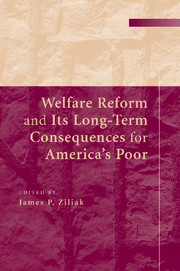Book contents
- Frontmatter
- Contents
- Contributors
- Preface
- Introduction
- 1 What We Know, What We Don't Know, and What We Need to Know about Welfare Reform
- 2 Welfare Reform and the Level and Composition of Income
- 3 How Have Expansions in the Earned Income Tax Credit Affected Family Expenditures?
- 4 How Families Are Doing Nine Years after Welfare Reform: 2005 Evidence from the Three-City Study
- 5 The Impact of Welfare Reform on Leaver Characteristics, Employment, and Recidivism
- 6 A Reexamination of the Impact of Welfare Reform on Health Insurance Among Less-Skilled Women
- 7 How Welfare Policies Affect Child and Adolescent School Performance: Investigating Pathways of Influence with Experimental Data
- 8 The Effects of Welfare and Child Support Policies on the Incidence of Marriage Following a Nonmarital Birth
- 9 Welfare Reform and Health among the Children of Immigrants
- 10 Mismatches and Unmet Need: Access to Social Services in Urban and Rural America
- Index
6 - A Reexamination of the Impact of Welfare Reform on Health Insurance Among Less-Skilled Women
Published online by Cambridge University Press: 21 January 2010
- Frontmatter
- Contents
- Contributors
- Preface
- Introduction
- 1 What We Know, What We Don't Know, and What We Need to Know about Welfare Reform
- 2 Welfare Reform and the Level and Composition of Income
- 3 How Have Expansions in the Earned Income Tax Credit Affected Family Expenditures?
- 4 How Families Are Doing Nine Years after Welfare Reform: 2005 Evidence from the Three-City Study
- 5 The Impact of Welfare Reform on Leaver Characteristics, Employment, and Recidivism
- 6 A Reexamination of the Impact of Welfare Reform on Health Insurance Among Less-Skilled Women
- 7 How Welfare Policies Affect Child and Adolescent School Performance: Investigating Pathways of Influence with Experimental Data
- 8 The Effects of Welfare and Child Support Policies on the Incidence of Marriage Following a Nonmarital Birth
- 9 Welfare Reform and Health among the Children of Immigrants
- 10 Mismatches and Unmet Need: Access to Social Services in Urban and Rural America
- Index
Summary
Introduction
The enactment of the Personal Responsibility and Work Opportunity Reconciliation Act (PRWORA) in 1996 represented not only an “end to welfare as we know it” but the completion of a process begun in the late 1980s: the separation of Medicaid from cash assistance. Under the Aid to Families with Dependent Children (AFDC) program, receipt of Medicaid was automatic for welfare recipients, and to a large extent, leaving AFDC meant losing not only cash assistance but also Medicaid coverage. Recognizing the work disincentive inherent in this arrangement, the authors of PRWORA instructed states to set income standards for Medicaid that were related to AFDC standards in effect at the time of PRWORA's passage rather than to eligibility for the states' new Temporary Assistance for Needy Families (TANF) programs. Consequently, former welfare recipients would be permitted to keep their public health insurance even if they were not eligible for cash assistance. Despite this precaution, it is possible that welfare reform led to a loss of Medicaid coverage through a variety of channels. Indeed, case studies of 13 states done by researchers at the Urban Institute (Holahan, Wiener, and Wallin 1998) showed that declines in welfare caseloads were accompanied by declines in Medicaid enrollment.
Women leaving welfare may have been unaware that they could keep their Medicaid coverage; potential applicants for welfare may have been deterred by the stricter welfare policies, missing Medicaid eligibility in the process; and in some states, the processes of applying for welfare and applying for Medicaid were sufficiently de-linked that a welfare applicant would need to go to a different office and provide different documentation in order to qualify for Medicaid.
- Type
- Chapter
- Information
- Welfare Reform and its Long-Term Consequences for America's Poor , pp. 217 - 254Publisher: Cambridge University PressPrint publication year: 2009
- 3
- Cited by



